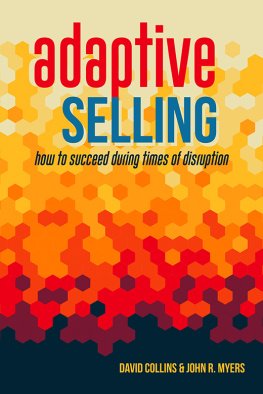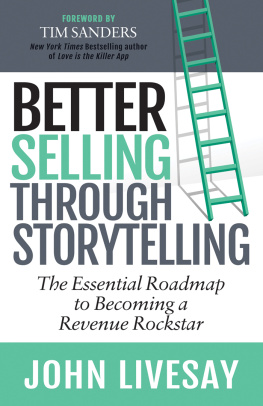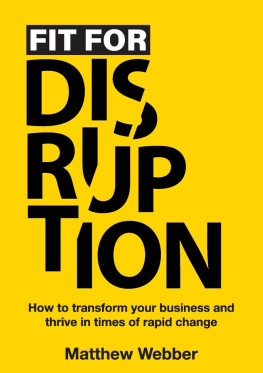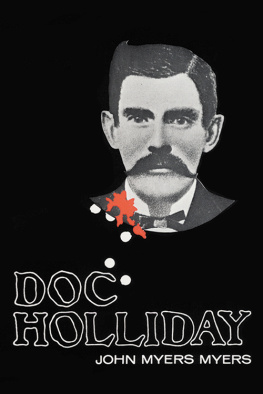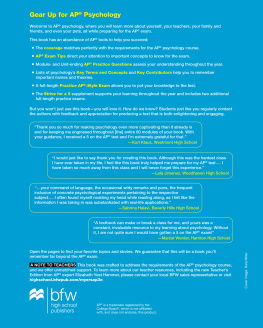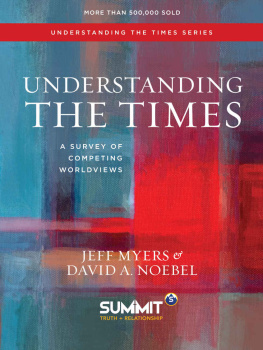John Myers - Adaptive Selling: How to Succeed During Times of Disruption
Here you can read online John Myers - Adaptive Selling: How to Succeed During Times of Disruption full text of the book (entire story) in english for free. Download pdf and epub, get meaning, cover and reviews about this ebook. genre: Politics. Description of the work, (preface) as well as reviews are available. Best literature library LitArk.com created for fans of good reading and offers a wide selection of genres:
Romance novel
Science fiction
Adventure
Detective
Science
History
Home and family
Prose
Art
Politics
Computer
Non-fiction
Religion
Business
Children
Humor
Choose a favorite category and find really read worthwhile books. Enjoy immersion in the world of imagination, feel the emotions of the characters or learn something new for yourself, make an fascinating discovery.
- Book:Adaptive Selling: How to Succeed During Times of Disruption
- Author:
- Genre:
- Rating:3 / 5
- Favourites:Add to favourites
- Your mark:
- 60
- 1
- 2
- 3
- 4
- 5
Adaptive Selling: How to Succeed During Times of Disruption: summary, description and annotation
We offer to read an annotation, description, summary or preface (depends on what the author of the book "Adaptive Selling: How to Succeed During Times of Disruption" wrote himself). If you haven't found the necessary information about the book — write in the comments, we will try to find it.
John Myers: author's other books
Who wrote Adaptive Selling: How to Succeed During Times of Disruption? Find out the surname, the name of the author of the book and a list of all author's works by series.
Adaptive Selling: How to Succeed During Times of Disruption — read online for free the complete book (whole text) full work
Below is the text of the book, divided by pages. System saving the place of the last page read, allows you to conveniently read the book "Adaptive Selling: How to Succeed During Times of Disruption" online for free, without having to search again every time where you left off. Put a bookmark, and you can go to the page where you finished reading at any time.
Font size:
Interval:
Bookmark:

PRAISE FOR
ADAPTIVE SELLING
Theres no question about the value of SOCIAL STYLE. I can tell you unequivocally and without a doubt that if it hadnt been for the Style training I took, I wouldnt be where I am today and have had the career success I have enjoyed. Theres just no way. It has been that one critically important skill that I think has made all the difference for me.
Jim Knauss II, Global Markets Leader, People Advisory Services, EY
Many of the sales processes and methods in the market today are fine and they can work. What they typically do not address is EQ, the softer set of selling skills that are required to be consistently successful in sales. And that comes at you from different dimensions. Its not just the client interactions. Its the pursuit team that you build on the selling side. Its the delivery leadership team and how they mirror the client from a SOCIAL STYLE standpoint, demographically, and from an organization-accountability perspective.
John Maguire, Senior Vice President Sales, Chief Sales Officer, Cognizant
If you could gain the magical interpersonal skills that would instantly enhance your ability to connect with your customers and co-workers like never before, would you be interested? If I said the same skills would also drive enhanced relationships with your friends and family, what would you say? TRACOMs SOCIAL STYLE and Versatility provide the Social Intelligence a person needs to honestly and authentically improve rapport, demonstrate enhanced leadership, and connect with those they interact with on a regular basis.
Mike Miller, Sr. Manager Learning & Development, Reynolds American, Inc.
SOCIAL STYLE is unquestionably a very powerful way of looking at the world. Its clear, its memorable, and its something that you can apply quickly as opposed to many other models. You only need to remember four Styles and how to work with each of them. Even in the heat of the moment you can quickly apply SOCIAL STYLEs to build a productive relationship.
Peter Matthews, Senior Partner
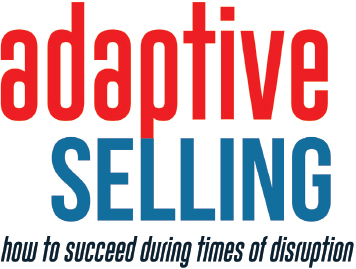
DAVID COLLINS & JOHN R. MYERS

www.BookPressPublishing.com
Copyright 2021 by The TRACOM Corporation. All rights reserved.
(303) 470-4900 (800) 221-2321 (U.S. only)
www.tracom.com
SOCIAL STYLE, The Social Intelligence Company, the Creator of SOCIAL STYLE, the SOCIAL STYLE Navigator, and TRACOM are registered trademarks of the TRACOM Corporation. SOCIAL STYLE Model is a trademark of the TRACOM Corporation. Additional trademarks of TRACOM include Behavioral EQ, Putting Emotional Intelligence to Work, the Behavioral EQ Model along with Adaptive Mindset, Unlocking Personal Agility, Adaptive Mindset for Resiliency, and the Resilient Mindset Model.
No part of this book may be reproduced, transmitted, or stored in any form or by any means, electronic or mechanical, without prior written permission from The TRACOM Corporation.
Any requests or questions for the authors should be submitted to them directly at
Published in Des Moines, Iowa, by:
BookPress Publishing
P.O. Box 71532, Des Moines, IA 50325
www.BookPressPublishing.com
First Edition
This book would not have been possible without the groundbreaking work of our founders, the ongoing support of our clients who have incorporated TRACOMs solutions into their sales organizations all across the globe, the people of TRACOM both past and present, and the entire community of several thousand SOCIAL STYLE certified facilitators who train hundreds of thousands of people each year.
We wish to acknowledge the contributions made decades ago to the field of behavioral science by TRACOMs Founders, Dr. David Merrill and Roger Reid. It was their original research and development that led to the creation of the SOCIAL STYLE Model. We hope that David and Roger would be very proud of the company they started as it has continued to advance their research to increase its impact across the globe. TRACOM has become the leading provider of critical soft skills solutions that have been proved to make a difference in performance and success. We are proud that millions of people around the world have used TRACOM to uncover hidden barriers to their performance and identify strategies that enable more positive outcomes and professional success.
We would like to especially thank all our clients in over 100 countries where our solutions are used. We especially thank Jim Knauss, Peter Matthews, Nancy Kopp, David Bruesehoff, Tracy Embro, Andrew Wright, John Maguire, Ernie Smith, Henry Hawk Macintosh, Mike Miller, Fred Dulin, Anita Natesh, and Tony Sammut for sharing their stories and insights into how TRACOM has benefitted them and their organizations.
CONTENTS
One of the most common questions we are asked by senior executives is, What makes a top sales performer? What makes certain people in a wide range of industries so successful at consistently winning big deals while others fail or only achieve sub-par outcomes? Is their success due to random chance, genetics, or do they simply do things differently from less successful sales people?
This is usually quickly followed by, What do you think is the best sales methodology to deploy? Is it Strategic Selling, Challenger Selling, Relationship Selling, or another one of the sales processes on the market? This is not an easy question to answer because there are sales people who succeed and who fail using each of the models. So it must be more than just choosing a sales process.
Equally important to these questions in todays world is, Will the characteristics and processes of the most popular selling approaches still be relevant in the world of selling and buying, given all the systemic disruptions that are occurring?
How many of these have you experienced?
Customers using technology and social media to gather informationget peer reviews, find competitive offerings, and locate pricing data without any interaction with a sales person.
A pervasive customer attitude of Dont contact uswe will call youmaybe.
Buying decisions being made or directed by globalized buying or project teams rather than being limited to individual stakeholders or procurement professionals.
Increasingly complex sales cycles that require a team-selling approach with more and more clients.
Internal demand for use of CRM systems, marketing automation, and other analytical tools that reduce sales peoples time building real connections with clients.
Starting in the early 2000s, we began to work with several high-level sales and business development professionals across a variety of global companies. They used a wide range of differing sales methodologies. They were all unique individuals and worked in many different industries in different cultures all over the world. Yet they all shared a common set of characteristics. And they were all highly successful! As we got to know them better, we realized that many of these individuals had also failed in sales at one point in their career. What changed? How did they learn the secret of how to sell so successfully? What were they doing differently from earlier in their careers when they struggled, and why was it working? Would these learnings help us all to adapt to the seismic changes occurring in the sales world?
Over the last several years at TRACOM, we have researched these issues to understand what these top performers had in common and to determine if these skill sets could be learned and applied by others. This book is a summary of what we have learned. It is designed to help you, the sales professional, to learn about and apply the key behaviors of top sales performers.
Next pageFont size:
Interval:
Bookmark:
Similar books «Adaptive Selling: How to Succeed During Times of Disruption»
Look at similar books to Adaptive Selling: How to Succeed During Times of Disruption. We have selected literature similar in name and meaning in the hope of providing readers with more options to find new, interesting, not yet read works.
Discussion, reviews of the book Adaptive Selling: How to Succeed During Times of Disruption and just readers' own opinions. Leave your comments, write what you think about the work, its meaning or the main characters. Specify what exactly you liked and what you didn't like, and why you think so.

